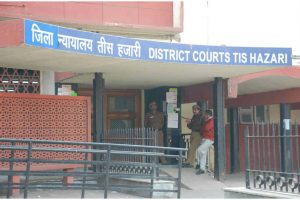Tis Hazari Courts, Delhi: Kirandeep Kaur, Civil Judge – 05, discussed the legal position on a coparcener’s daughter also being a coparcener of the Hindu Undivided Property.
Factual Matrix
The plaintiffs were the lineal descendant of Sunder Lal who died intestate. He was the owner of a property and after his death, the plaintiffs succeeded the said property which is in dispute in this suit.
Defendant was the daughter of Kanhya Lal, son of late Sundar Lal, who was in the habit of drinking and used to do nothing and due to being a drunkard, he died.
The defendants were six daughters and one brother. Their father died, when all of them were minors. Their father was in very miserable condition and was having no means. The plaintiffs 1 to 3 brought them up and got them married. The defendant had no place to reside after marriage, therefore, taking pity on her condition, she was allowed to reside in the room in the question on her promises to vacate as and when asked with the leave and license of the plaintiffs and her possession is mere permissive.
The said suit property required immediate re-construction. When the defendant was asked to vacate the premises for reconstruction, there came a flat refusal to do so.
In view of the above-stated circumstances, a legal notice was served and virtue of the same, the license of the defendant was terminated while being asked to vacate the suit property and pay Rs 10,000.
Analysis
Since the defendant did not adduce any evidence to prove that the plaintiff had suppressed any material fact, the said issue of material facts being suppressed by the plaintiff was decided against the defendant.
It was alleged that the plaintiff had no locus standi to file the present suit because the plaintiffs, the defendant and the sister and brothers of the defendant were all the co-owners in the suit property being legal heirs of the owner of the property. Plaintiffs and defendant both parties cannot dispossess each other from the suit property and cannot demand the mesne profit or create the third party right in the suit property.
Whereas the plaintiff alleged that the suit property was an ancestral and coparcenary property but the defendant was never a coparcener in the Hindu Undivided Family, she thus had no title, right and interest in the suit property.
In the present matter, it was inferred that the defendant was the granddaughter of Sunder Lal or in other words, the cousin sister of the plaintiff.
Legal Question
Whether the daughter of the coparcener who has died before the commencement of amendment of 2005 in Section 6 of Hindu Succession Act is coparcener in Hindu Undivided Family?
Application of amendment in Section 6 of Hindu Succession Act was discussed in detail in Supreme Court’s decision of Vineet Sharma v. Rakesh Sharma, (2020) 9 SCC 1.
Though the father of the defendant passed away on 9-5-1987, but as held by the Supreme Court in the above-stated case that, the right in coparcenary is by birth, it is not necessary that father coparcener should be living as on 9-9-2005.
In view of the above-stated position, the defendant being the daughter of a coparcener is a coparcener in Hindu Undivided Property. Accordingly, she had the right by birth in the suit property as it was admitted fact that suit property was ancestral property.
Therefore, the defendant was the coparcener in the suit property, and she had the right, title and interest by birth by virtue of amendment in the Hindu Succession Act.
Hence, the plaintiff did not have locus to seek possession from the defendant on the ground that she was licensee in the suit property.
In view of the above-discussed position and background, the suit of the plaintiffs was dismissed. [Gian Chand v. Kishan Lal, CS No. 602704 of 2016, decided on 25-11-2021]

